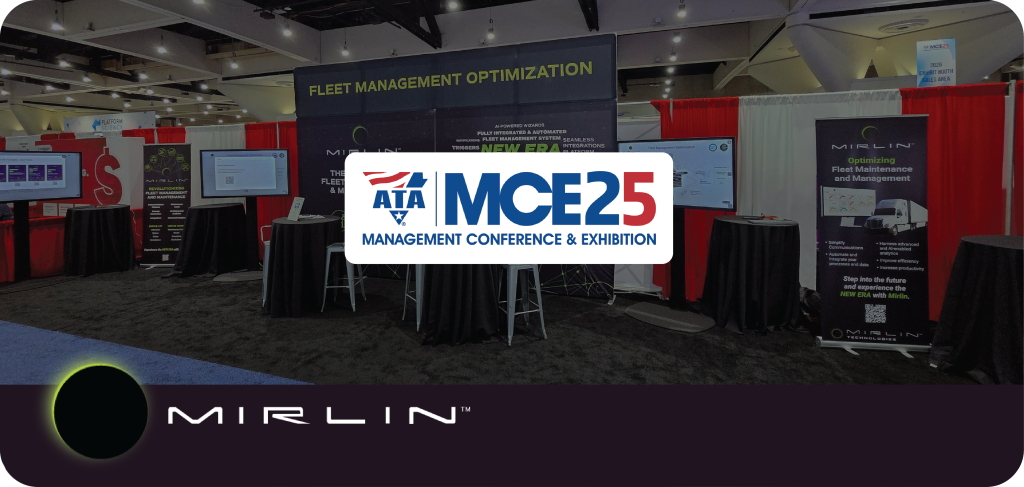MIRLIN BLOG
The Impact of Process Automation on Fleet Operations
In the ever-evolving landscape of fleet management, technological advancements continue to reshape the way companies optimize their operations. Among these advancements, process automation stands out as a transformative force, revolutionizing how fleets are managed and operated. Let’s explore the profound impact of process automation on fleet operations and how it can drive efficiency, cost savings, and overall performance.

What is Process Automation?
Process automation involves using technology to automate repetitive tasks and streamline workflows within an organization. In the context of fleet management, this can range from automating route planning and dispatching to implementing automated maintenance scheduling and compliance monitoring.
Transforming Fleet Operations
Efficient Dispatch and Routing
Automating dispatch processes ensures timely assignment of tasks based on predefined criteria such as vehicle availability, proximity to destinations, and load capacity. This reduces response times and optimizes route planning, leading to cost savings and improved customer satisfaction.
Real-Time Monitoring and Alerts
Automation enables real-time monitoring of vehicles, drivers, and assets using GPS tracking and telematics systems. Fleet managers receive instant alerts for events such as route deviations, vehicle breakdowns, or driver safety violations, allowing for prompt intervention and issue resolution.
Predictive Maintenance
Process automation can integrate with vehicle telematics to monitor engine diagnostics and maintenance schedules. By analyzing vehicle diagnostics and performance metrics in real-time, fleet managers can schedule preventive maintenance, reduce downtime, and extend the lifespan of fleet assets.
Streamline Compliance Management
Automation ensures compliance with regulatory requirements such as driver hours of service (HOS) and vehicle inspection schedules. Automated systems generate alerts for upcoming deadlines and monitor adherence to standards, minimizing the risk of fines and penalties.
Optimize Resource Utilization
By automating resource allocation and task assignment, fleet managers can optimize the utilization of vehicles and drivers. This leads to reduced idle time, improved asset utilization, and increased operational efficiency. By identifying under-utilized assets and inefficient workflows, fleet managers can make informed decisions that maximize operational efficiency.

Benefits of Process Automation
Cost Savings: Automation reduces manual labor and eliminates human errors, leading to significant cost savings in fuel, maintenance, and labor expenses.
Improved Accuracy and Consistency: Automated processes ensure consistent execution of tasks and data accuracy, enhancing operational reliability and customer satisfaction.
Enhanced Safety: Real-time monitoring and automated alerts help identify unsafe driving behaviors, promoting a culture of safety within the fleet.
Scalability and Adaptability: Automation solutions are scalable and adaptable to evolving business needs, accommodating fleet growth and changes in operational requirements.
Train and Empower Teams: Provide training and support to employees to leverage automation tools effectively and embrace digital transformation.
Implementing Automation in Fleet Management
To harness the benefits of process automation, fleet managers should consider adopting a comprehensive fleet management software solution. Look for a system that offers:
Integration Capabilities: Seamless integration with existing telematics, GPS, and ERP systems.
Customization: Flexible automation rules and workflows tailored to specific operational needs.
Analytics and Reporting: Robust analytics tools to track KPIs and performance metrics in real-time.
Process automation is reshaping the future of fleet operations by enabling efficient, data-driven decision-making and optimizing resource utilization. By embracing automation technologies, fleet managers can unlock new levels of productivity, cost savings, and operational excellence. As the industry continues to evolve, process automation will play a pivotal role in driving innovation and ensuring the competitiveness of fleet management organizations. Embrace automation to transform your fleet operations and navigate the challenges of the modern transportation landscape with confidence.
Mirlin Wiz
The Mirlin Wiz is a spokesperson for Mirlin Technologies. With over two decades in fleet maintenance, The Mirlin Wiz understands the complexity of the industry. Armed with cutting-edge technology, Mirlin is introducing a new approach to embracing these technology trends, including an innovative end-to-end technology platform. ‘The Wiz’ is excited to inform you about Mirlin Technologies New Era approach to fleet management and and maintenance!

Smart Orchestration Is the New Competitive Advantage for Fleet Leaders
Fleet management technology is evolving faster than ever, but the biggest competitive advantage for modern fleets isn’t a new dashboard, telematics device, or maintenance system. It’s the ability to connect and orchestrate the systems you already have.

Mirlin Technologies Recognized by 2025 CIO Awards Canada
Mirlin Technologies is proud to announce it has been named one of the recipients of the prestigious 2025 CIO Awards Canada, presented by International Data Corporation (IDC) Canada and CIO. This national recognition celebrates Mirlin’s groundbreaking work in delivering AI-powered business solutions that are reshaping the transportation industry and driving measurable value across sectors.

Fleet Optimization in Focus | Mirlin Technologies at MCE 2025
Discover how Mirlin Technologies showcased its AI-powered fleet optimization platform at MCE 2025. Learn how predictive maintenance, data orchestration, and automated processes transform fleet management through an intelligent, connected ecosystem.
